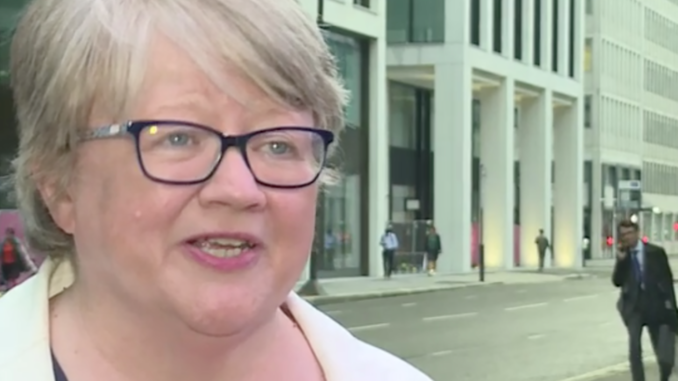
The new Prime Minister Liz Truss has this week appointed her friend and ally Therese Coffey as the Deputy Leader and Secretary for Health and Social Care, but how much do we really know about the fourth Health Secretary in just over a year, and what can we expect from her time in the role?
Background
Therese Coffey (until recently the Work and Pensions secretary) is seen by many as a divisive figure, with her views on same sex marriage and abortion in opposition to many. The 50-year-old withdrew from undergraduate studies at Oxford but went on to gain a bachelor’s degree and then PhD in Chemistry from University College London. She qualified as a chartered management accountant, and had stints at a subsidiary of Mars and the BBC. She was elected as an MP in 2010 and is known as a hard worker by fellow Conservatives. Previous Culture Minister Nadine Dorries has commented in the press that “nothing ever goes wrong” in a department led by Coffey. A colleague says:
Her political views are of the free market and the hard right wing, including strong anti-abortion views.
Coffey has shown an alarming lack of compassion around the plight of working people by scrapping a £20 weekly uplift to universal credit payments introduced during the pandemic, and in her dealings with footballer and social activist, Marcus Rashford where she was involved in a Twitter spat rejecting one of his claims about poverty.
Political views
As well as funding and staffing, the NHS requires stability and direction and needs someone in charge who has deep understanding of the real issues instead of seeking ill-considered ‘reforms’ in the hope that this will somehow or other release vast swathes of cash and solve all our problems. Such qualities were not exhibited by Hancock, Javid or Baker and it is not difficult to imagine that Coffey will simply offer more of the same. Indeed, PM Liz Truss and many of her close cabinet colleagues are known to be advocates for shady right wing thinktanks including the Institute of Economic Affairs who make no secret of their contempt for the NHS as a publicly funded health service.
As easy as ABCD?
In one of her first interviews to the media, Ms Coffey highlighted her NHS priorities as ‘ABC and D – Ambulances, Backlog, Care, Doctors and Dentists:’
I’m very conscious that we want to be promoting what we can do better for patients, so they can get their appointments, whether for a doctor or a dentist to tackle the backlogs, the ambulances and of course social care.
Immediately there were criticisms of this statement, which makes no reference to nurses (the largest section of the workforce) or indeed finances, which are crucially lacking in an underfunded NHS. She will have been tasked with managing the ambulance crisis and reducing waiting lists in time for the next election since it will be essential for the Conservative party to show the public some progress in these areas for the NHS not be a huge electoral liability. Whether this is in any way feasible remains to be seen, but Coffey’s positive reference to the new hospital building programme, which in effect remains unfunded, indicates the Treasury will continue to be a major influence on what can be done, while the government spin machine will continue in overdrive to persuade a sceptical electorate that the NHS is ‘being given more funding than ever before’.
Early Plans
One of the first announcements is that Ms Coffey is considering handing hundreds of millions of pounds to care homes to relieve pressure on hospitals by paying them to take patients who cannot be discharged because of lack of social care. However, there is no guarantee this huge sum would be approved, particularly when one considers the eye wateringly large sums being channelled to energy companies. Given lack of capacity and staffing in care homes (165,000 vacancies in the care sector) this in any case may simply be a move to support the current business model in difficult times, much like clinical contracts to private providers handed out during the covid pandemic.
The inability to discharge medically fit patients due to a lack of community or care home provision is indeed a very significant problem facing the NHS, which results in overflowing emergency departments and dangerous ambulance delays as paramedics are unable to hand over patients into the hospital. It is worth noting though that this ‘discharge to assess’ scheme, was something that was previously in operation during the Covid peaks,
The plan to cut NHS finances by £10 billion and give it to social care only serves though in robbing Peter to pay Paul, and shows a clear lack of understanding of the magnitude of the crisis we are facing in the health service.
A meaningful response would restore massive cuts to Local Authority budgets for social care, and improve staff pay, conditions, support and career structure to recruit and retain workers.
Coffey is also understood to be considering extending the capability of the NHS 111 service so that it can divert more patients to pharmacists as a means of reducing the strain on GP services, at a cost of around £100m.
The new Health Secretary is also expected to look into the pension tax crisis facing senior doctors which has gone unaddressed for years now and essentially means that some medics are paying to attend work, and have little option but to retire earlier than they would have liked in the midst of a staffing crisis.
As always, the devil will be in the detail, but one thing is for sure, there are no quick fixes to a problem the Conservative government has not only created, but actively ignored over the last 12 years.
Samantha Wathen, Press Officer for Keep Our NHS Public

She will ruin our NHS, a tory right wing extremist, she is anti abortion,anti LGBT right,, claims its her faith to reject their rights.